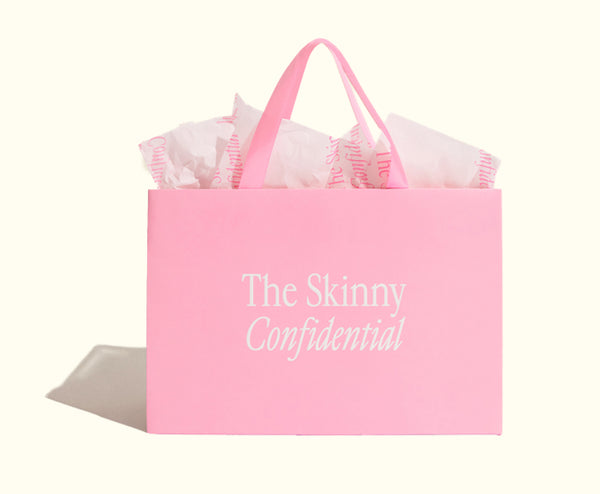
Exfoliation is one of the most important steps in your skincare routine. No, you don’t do it every day, but weekly or biweekly exfoliation helps keep textured, dull skin at bay.
But have you ever wondered how exfoliation actually works? Because it’s not just scrubbing your face and scraping away dead skin cells. The truth is, to achieve the best results, you should understand every part of your skincare routine.
Knowing what you’re really doing for your skin isn’t just “nice-to-know” information. Chances are you’ll be much more motivated to do it—and do it correctly. And exfoliation is one of those things you don’t want to get wrong.
Over-exfoliation can damage your skin and cause irritation, which defeats the purpose of the whole process in the first place. We want skincare benefits, not setbacks, after all.
So, today, we’re going to explain exactly how exfoliating your face works and how to do it safely for all gains and no pain. Here’s what you need to know:

What Does Exfoliation Remove and Deplete?
Dead Skin Cells
Dead skin cells build up on the surface of your skin, which affects everything. We’re talking rough texture, dullness, uneven makeup application, and poor product absorption. Exfoliation helps remove these dead cells, which is essential for smooth, radiant skin. Learn how to get rid of dead skin cells here.
Excess Oil
When dead skin cells clog pores, oil can become trapped, leading to acne and breakouts. As exfoliation scrapes away those dead skin cells, it also removes extra oil from below, clearing your skin and balancing oil production. Essentially, exfoliation is one of the best ways to deep clean pores.
Sweat
Dead skin cells and other impurities trap oil, but they can also trap sweat. And what’s the result of that? A higher likelihood of oily, greasy skin. Exfoliation can help sweat evaporate to make your skin feel fresh and less oily.
Pollution
As we go about our day, dirt and toxins build up on the skin’s surface. These pollutants can harm skin health if left unchecked. Exfoliating your face helps clear the debris, preventing clogged pores, dullness, and damage to your skin barrier.
Product Buildup
Sometimes, skincare products like sunscreen and makeup can leave residue on your skin. This buildup can clog pores, dull your complexion, and reduce the effectiveness of your other skincare products and cosmetics. Exfoliating helps remove all of that build up, giving you a nice, clean slate to work with.
Natural Moisturizing Factors
When exfoliating, it’s important to find the right balance. Scrubbing too hard or using too much product can strip your skin of its Natural Moisturizing Factors (NMFs). These are hydrating compounds, including certain lactic and amino acids, that keep your skin moisturized. Without enough NMFs, your skin can become dry, and your skin barrier may weaken.

Barrier Oils
Barrier oils are natural oils that sit on your skin and help strengthen and protect its outer layer. You may think you want your face completely oil-free, but you need those good oils to help balance everything out. However, exfoliating too much can strip both good and bad oils, weakening your skin’s natural defense against toxins.
Healthy Skin Cells
The goal of exfoliation is to remove dead skin cells and encourage the growth of fresh, radiant skin. But if you overdo it, you can scrape off healthy skin cells that aren’t ready to come to the surface yet. The result? Red, irritated, and angry skin.
Beneficial Bacteria
Just like in your gut, there are good bacteria living on your skin—this is called the “skin microbiome.” These helpful microbes support your immune system and strengthen your natural skin barrier. And, you guessed it, too much exfoliation can disrupt both the good and bad bacteria balance.
What Happens When You Over-Exfoliate?
Redness and Irritation
When you over-exfoliate, you lose healthy skin cells and weaken your natural skin barrier. This can cause redness, irritation, and even abrasions that look and feel like rug burns.
Dryness and Flaking
If you strip away all your natural oils with over-exfoliation, you’ll likely end up with flaky, dry skin. And when your skin becomes dry, your body tries to compensate by producing more oil, which can lead to greasier, oilier skin down the road. Yeah, it’s kind of like a cycle.
Weakened Skin Barrier
Your skin is the first line of defense against toxins and bacteria. It’s one of the main reasons skincare is so important! However, over-exfoliation can weaken the skin's barrier. This not only leads to unhealthy skin, but it can actually impact your immune system, too.
Acne Breakouts
Even if you don’t have breakout-prone skin, over-exfoliation could trigger acne. It irritates and inflames the skin, causing excess oil production. When your skin barrier is weakened, bacteria can penetrate more easily, and pores are more likely to get clogged.
Plus, over-exfoliation can cause dead skin cells to shed unevenly or in clumps, resulting in breakouts rather than clearer skin. Definitely not what we’re after here.
Premature Aging
Without a strong skin barrier, you don’t have protection against UV rays, pollution, and other environmental stressors. This can cause collagen breakdown, loss of elasticity, and wrinkles.
If you’re interested, here are more anti-aging hacks for your skin and tips on how to improve skin elasticity naturally.

How to Exfoliate Without Damaging Skin Barrier?
Make sure the frequency matches your skin type.
How often you exfoliate really depends on your skin—specifically, its sensitivity, texture, and acne-proneness. If you have sensitive skin, for example, exfoliating too frequently can cause irritation and damage.
Make sure the frequency matches your skin type to maintain healthy skin and prevent issues like redness or premature aging. Here’s a quick guide:
-
Oily Skin: 2-4 times a week
-
Dry Skin: 1-2 times a week
-
Sensitive Skin: Once a week
-
Combination Skin: 2-3 times a week
-
Normal Skin: 1-3 times a week
Choose the right type of exfoliator for your skin.
If you want a glowy, smooth, radiant appearance, it’s important to choose the right exfoliator for your skin type. And what better time to learn about the differences in exfoliants?
So, we have two types of exfoliation: chemical and physical. Chemical exfoliation is all about gently exfoliating using powerful ingredients like salicylic acid and alpha-hydroxy acids (AHAs). These ingredients work beneath the surface to clear away dead skin without any harsh scrubbing. It’s perfect if your skin is sensitive or prone to breakouts.
On the other hand, physical exfoliation involves manually buffing away dead skin by shaving your face and body, using scrubs, or trying tools like the TSC Butter Brush. But be careful, because it can sometimes be too rough, especially if your skin is delicate.
Knowing what your skin truly needs will help you pick the perfect exfoliator that leaves you feeling fresh, smooth, and radiant every time.
Exfoliate only at night to give your skin time to heal.
Skin naturally repairs itself overnight, so it’s best to exfoliate before bed. Plus, exfoliation leaves your skin vulnerable to UV rays, increasing your risk of sun damage.
Give your skin time to regenerate overnight and build a fresh, healthy layer while you sleep. This will give you maximum benefits without the sun damage.
Use a barrier-repairing moisturizer right after.
Exfoliation will remove some natural oils, leaving your skin feeling a little sensitive. To restore some moisture, renew skin texture, and protect that underlayer of skin, use a good moisturizer.
You really want a moisturizer designed to repair your skin barrier. We like Dermalogica BioLumin-C Vitamin-C Gel Moisturizer or the Inkey List Bio-Active Ceramide Moisturizer.
Apply extra sunscreen in the days after exfoliation.
Remember, skin is sensitive to the sun post-exfoliation, so SPF is essential. And if you’re using chemical exfoliants that take a while to dissolve skin cells, UV rays can actually interfere with those products and make them less effective.
So, coat your skin with extra SPF after exfoliating, and reapply as often as every 30 minutes. Use a mineral sunscreen, like the TSC Caffeinated Sunscreen, even if you’re inside. This helps you to avoid sun damage and reap the full benefits of your chemical exfoliants.
Pay attention to how your skin responds to your routine.
Exfoliating should help your skin so long as it’s done right. If your skin feels excessively dry or irritated since adding exfoliation to your routine, it’s time to rethink your approach.
Maybe you need to exfoliate less often or switch from a physical to a chemical exfoliant. On the other hand, if you’re not seeing improvements in oil production, skin texture, acne, or tone, you might want to increase the frequency or try a different product.
Experiment to figure out what works for you. However, always make sure to pay attention to what your skin may be trying to tell you.
When done right, exfoliation removes dead skin cells, impurities, and excess oil from your skin!
Exfoliation should be a key part of your skincare routine, given how beneficial it is. But it’s also one of the few processes that can actually cause damage if not done correctly. So, follow these tips and get excited about the smooth, glowing skin you’ll soon see in your mirror.
We talked a lot in this post about the risks of over-exfoliating, but what about if you don’t do it enough? Here’s what happens when you don’t exfoliate regularly. And for more of the best non-toxic, high-quality skincare and wellness products, browse The Skinny Confidential Shop.






